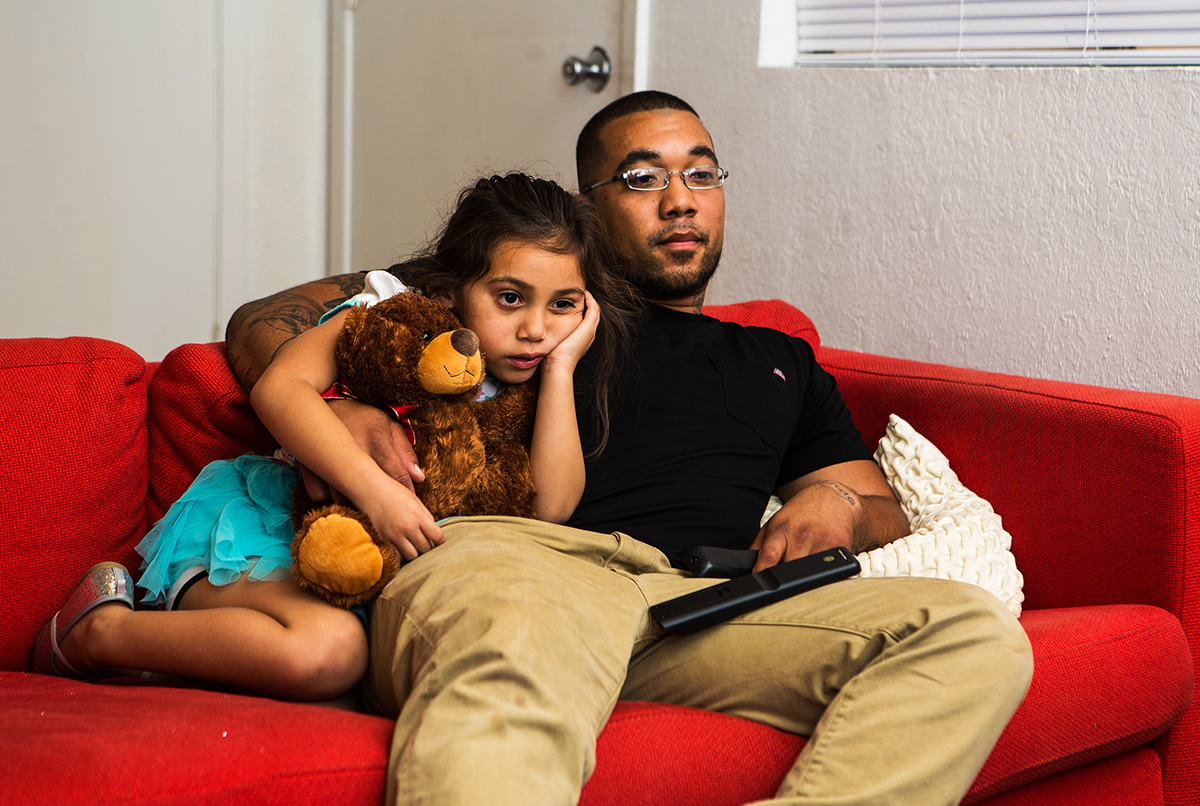Blanket Criminal History Policies Create a Rental Hurdle for Thousands
By Travis Putnam Hill
Reporting Texas

Michael Bowers, a single father to his daughter, Hazel, share an apartment in North Austin. He’s had trouble finding places to rent because of a minor theft he committed when we was 19. Dagney Pruner/Reporting Texas
By Travis Putnam Hill
When Michael Bowers was just 19, he was arrested for stealing a debit card and going on a $340 shopping spree with some friends.
“I was young,” he said. “We were drinking. There was a card. I was like, ‘I’m going to use that to buy stuff that I want.’ It was a dumb mistake.”
Bowers spent a few days in jail but never went to prison. Instead, he was put on probation. Nearly nine years later and after paying more than $10,000 in fines and court-related fees, he’ll soon be eligible to wipe the charge from his record.
But one consequence of that arrest continues to plague him: Most landlords refuse to rent to him.
“The most frustrating thing is I’m just a single dad,” said Bowers, who lives in Austin with his 6-year-old daughter. “I work hard, and I just want to give my child a place to live.”
Tenant advocates and legal aid lawyers say many landlords reject tenants based on their criminal history, without considering the nature of the crime, how long ago it occurred, or in some cases, whether an arrest led to a conviction. Applicants flagged through criminal background checks often are rejected without a chance to explain their situations.
With affordable housing in short supply in Austin and other major cities, and a growing awareness of the uneven implementation of criminal justice, housing providers are facing pressure to reconsider blanket rejections of people based on criminal histories.
More than one in four adults in the U.S. has a criminal record, according to the National Employment Law Project. Each year since 2006, Texas state prisons have released more than 70,000 inmates, and in 2015, there were more than 829,000 arrests in the state.
In Travis County, more than 2,400 individuals are released from prison each year, according to the Austin/Travis County Reentry Roundtable. Nearly 20,000 more people are on parole or probation.
“Criminal history is one of the significant barriers to housing that we know of,” said Juliana Gonzales, executive director of the Austin Tenants Council. “And in Austin, any barrier to housing is a huge barrier, because we live in a rental market where landlords just don’t have to rent to people they don’t want to. There is always someone else in Austin who will rent this property.”
In April, the U.S. Department of Housing and Urban Development warned landlords that overly broad criminal history policies could be considered to be discrimination, because of the disproportionately high arrest and incarceration rates of blacks and Latinos.
Criminal justice advocates say that such policies also make it harder for someone to re-enter society after jail and be rehabilitated, and contribute to homelessness and family instability.
Michael Bowers has had to rent single rooms from strangers he found online. Drug activity and weapons at some of these homes made him question his capacity as a father. He thought, “This is not how I’m supposed to take care of my daughter.”

Michael Bowers paints his daughter Hazel’s nails before leaving for his second job. Dagney Pruner/Reporting Texas
This past June, Bowers found someone who would rent to him for the first time in his life. But the day he moved in, he found cockroaches crawling everywhere. When the landlord was reluctant to address the infestation, Bowers said he had to choose: “Either move into a house that’s flooded with roaches and pray CPS doesn’t come to take my child, or move back to how we used to live with random people doing Lord knows what.”
He stayed. As his landlord put it when he threatened to leave: “Where are you going to go?”
Bowers had to agree: Who’s going to rent to a 28-year-old guy with a criminal record who’s never rented before?
“The problem with precluding people from being able to have fair access to housing is it reduces your choices and your ability to make choices,” said Lewis Conway Jr., a criminal justice advocate who spent eight years in prison for voluntary manslaughter.
Conway said his limited options for housing led him to seek romantic relationships solely because the women had places where he could stay. When a relationship with one woman went sour, she used his criminal history to win custody of their two children.
He said his housing situation was one reason he lost custody, and why he married another woman, “just to prove a stable household.”
Since Conway was released from prison in 2000, he’s worked as a community activist, music producer and song publisher, and has written a book chronicling his challenges finding jobs and housing. Still, he said, “even up to today, I can’t get housing in my name.”
Landlord groups contend that vetting applicants’ criminal histories is about keeping communities safe.
David Mintz is the vice president of government affairs at the Texas Apartment Association. He said the reasons for background checks are “the safety of other residents, employees at the property, and of the property itself. And then often times, you’ll see community pressures, either through neighborhood groups or local government, about who is living at the property.”
But criminal history policies that are too broad — for example, that cover any arrests or convictions over a lifetime — tend to preclude as renters non-violent offenders and people who never were convicted.
An October report from the Austin/Travis County Reentry Roundtable assessed criminal background policies of 80 of the 113 publicly subsidized housing properties in the area. About a quarter of them equated arrests with convictions, regardless of how the case turned out. Nearly half banned felons without clarifying which crimes would make someone unsuitable as a tenant. The bans covered criminal histories ranging from seven years to a lifetime.
“Nobody disagrees with wanting a safe rental community,” said Fred Fuchs, housing group coordinator with Texas Rio Grande Legal Aid. “But you don’t achieve that by simply having unreasonable policies that would keep out people that would otherwise be good tenants.”
He said the answer is more individualized determinations that would consider how long ago the person committed the crime, whether they have committed other crimes, and how hard they have worked toward rehabilitation.
The HUD guidelines issued earlier this year included recommendations that landlords consider a more individualized approach. However, housing providers are not bound to follow the guidelines.
Still, industry groups are responding. In May, the National Apartment Association released a white paper on best practices to members, which include adjusting screening policies to include only certain types of offenses, laying out clear justifications for those policies, and allowing applicants to explain mitigating circumstances, among others.
The Texas Apartment Association amended its standard rental application this year by removing questions about arrests and deferred adjudications, and including only those about convictions and probation for felonies and sex crimes.
But without legislation or mandates from HUD, there are many questions about what constitutes a reasonable policy.
“I think it remains to be seen how the guidance is actually implemented and how it evolves,” said Mintz, of the Texas Apartment Association. “It’s still relatively new for the industry, and unfortunately, it doesn’t give a lot of clear-cut standards.”
The prospect of change seems distant to those close to the issue.
“It feels urgent to me, because I don’t see anything happening that looks like it’s building a solid path towards people being able to have access to housing in a meaningful way,” said Lauren Johnson, an advocacy fellow at the Austin/Travis County Reentry Roundtable.
For folks such as Conway with criminal histories, the struggle to secure adequate housing is likely to continue.
“We’re not even fighting for equal rights at this point,” Conway said. “We’re fighting for basic human rights to shelter. I’m not asking you to give it to me, either. I’m paying for it.”